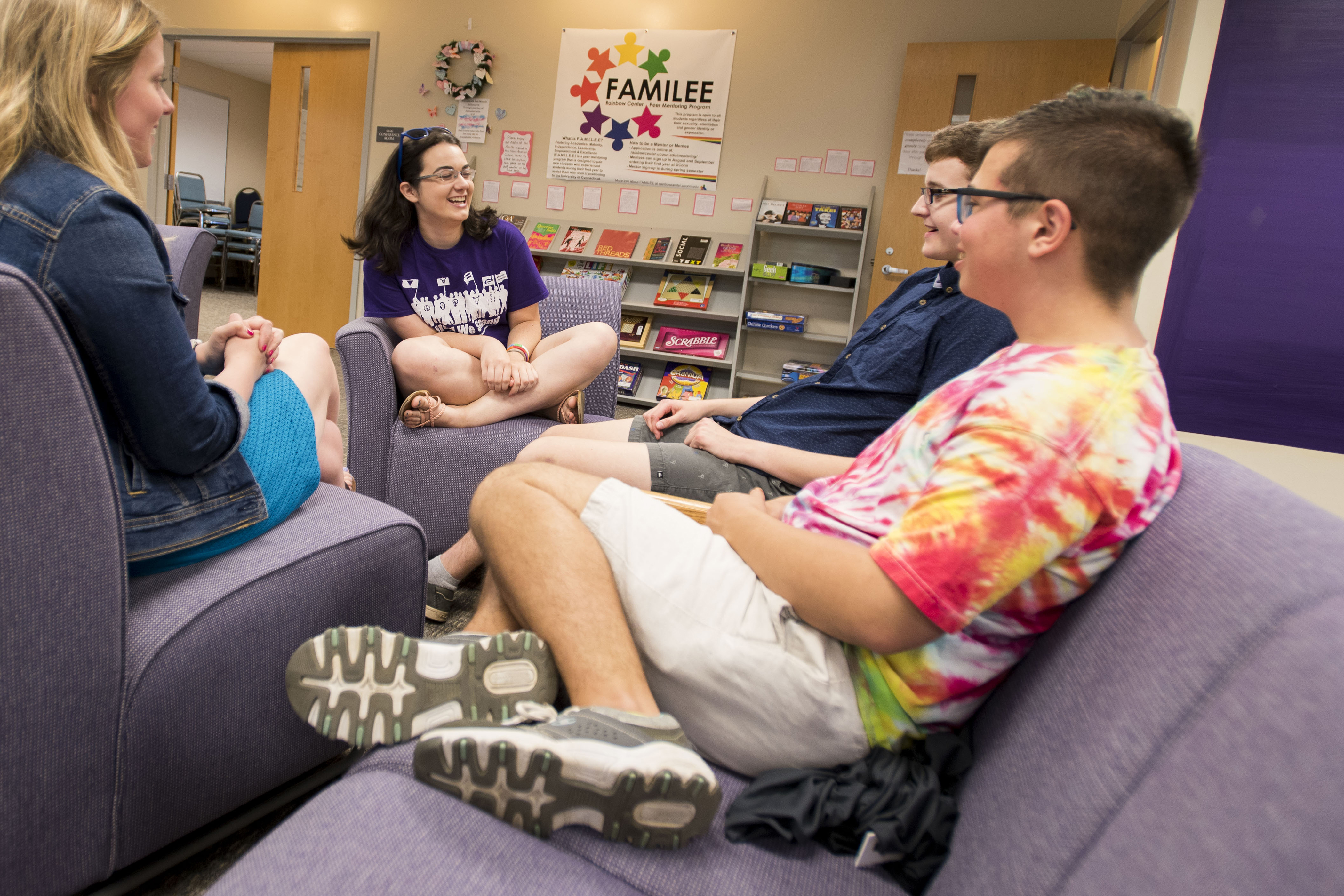The Rainbow Center is making a positive difference at UConn on a daily basis. One of five cultural centers on campus, its basic mission is to serve the community of diverse gender identities, gender expressions, and romantic and sexual orientations.
The Center accomplishes its mission by providing resources, services, education, training, and advocacy, and offering opportunities for personal growth, leadership development, and community engagement.
But there’s so much more to the Rainbow Center than that. At its core, it’s about developing relationships and creating a home on campus for UConn’s LGBTQIA+ and allied community.
“I could not imagine my UConn experience without the Rainbow Center,” says Zane Carey ’18 (CLAS), who recently graduated with a degree in urban studies. The Stratford, Connecticut, native will be a graduate student in the fall in public administration. “Every single one of us that are part of the Rainbow Center are going through our own journey, and we all learn from each other.”
When I got to UConn, I found my space and my voice at the Rainbow Center.” — Zane Carey
This summer, the Rainbow Center will welcome a new director in Kelsey O’Neil. O’Neil joins UConn after previously serving as assistant director for the Center for Diversity and Inclusion at Xavier University in Cincinnati.
Nationwide, June is Pride Month for the LGBTQIA+ community, and celebrations and parades are being held in cities and towns all over the United States. It’s quieter time on a college campus, so the Rainbow Center focuses its programming on LGBT History Month in October.
“We do a lot of overlapping events with the other cultural centers during their featured months,” says Julia Anderson ’18 MA, program coordinator for the Rainbow Center. “This October, we will be celebrating our 20th anniversary here at UConn, so we’ll make that a special time.”
There will be events as part of National Coming Out Day on Oct. 11, and a special anniversary event two days later. Keynote speakers and personal monologues will all be part of those days. The center will also participate in the first International Pronouns Day on Oct. 17.
The Center is also involved with Homecoming and Family Weekend in the fall.
A number of programs are offered by the Rainbow Center throughout the academic year to serve both the specific LGBTQIA+ and allied community and the entire University population.
The F.A.M.I.L.E.E. mentoring program is one of the most important for students who are new to the Storrs campus.
“Students who are already out when they come to UConn usually have to come out again when they get here,” says Anderson. “The program gives new students an experienced student to help guide them through the adjustment to college.”
Another popular program is the weekly “Out To Lunch” lectures, which cover various topics with guest speakers from the academic world as well as community activists. Undergraduate students have the option of taking the series as an elective class.
“Feeling isolated and alienated is common, so the Rainbow Center builds a sense of community,” says Jack Grunert ’19 (CLAS), a senior from Enfield, Connecticut, who is majoring in English and ecology environmental biology. “From a more practical standpoint, we learn a lot about the history of our culture. We have a rich culture, which is full of joy and happiness. You want to feel good about being out and share this part of life with others.”
The culture at UConn has changed quite a bit since the Rainbow Center was founded in 1999. At that point, the school was trying to develop tolerance and baseline safety.
Since then, the Rainbow Center has been working toward tolerance, acceptance, celebration, and liberation for the LGBTQIA+ community.
“Over the past 20 years, we’ve come a long way,” says Anderson. “We’re now in a good place to be. Today, we are ranked as one to the top 30 best colleges for LGBTQIA+ students by College Choice.”
In addition, the state of Connecticut has been passing LGBTQIA+ inclusive legislation for several years.
The Rainbow Center works with other groups and offices on campus, such as the Center for Career Development, to prepare students for the next phase of their life after graduation.
In addition, the Rainbow Center holds Husky Ally Safe Zone training sessions that are open to all members of the University community, on how to be more inclusive in the classroom and on campus. The center also produces a gender and pronoun guide, a gender-inclusive restroom map, and an LGBTQIA+ dictionary.
Both Carey and Grunert point to the True Colors conference for high school students, which takes place each year in Storrs. It is the largest and most comprehensive LGBTQIA+ youth issues conference in the nation, with more than 3,000 youth, educators, social workers, clinicians, family members, and clergy participating in workshops and events. The Rainbow Center helps with the coordination of that event.
“I came out in middle school, and went through a lot in high school,” says Carey. “I was constantly defending myself. I was proud, but did not have enough pride to fight for myself all the time. When I got to UConn, I found my space and my voice at the Rainbow Center.”
You can support the LGBTQIA+ and allied community through a gift to the Rainbow Center: http://s.uconn.edu/rainbowcenter.



